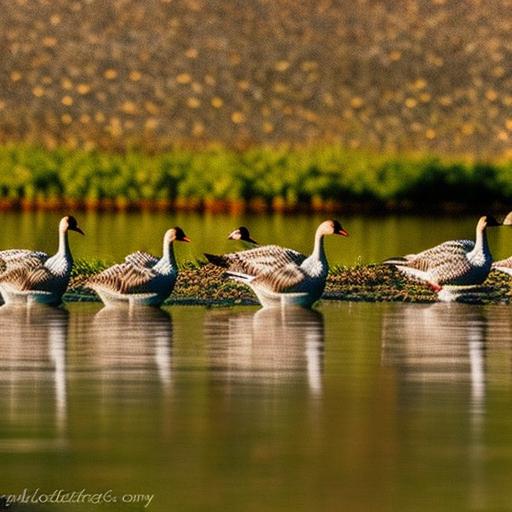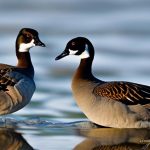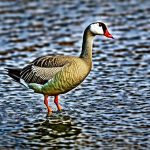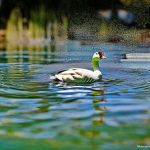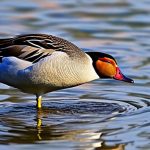Geese are large waterfowl that are known for their distinctive honking sound and V-shaped flying formation. They are found in various parts of the world and are known for their adaptability to different environments. Geese are social animals that live in flocks and are highly territorial. They are herbivores and feed on grass, aquatic plants, and grains.
Understanding geese behavior is crucial in order to effectively keep them away. Geese can become a nuisance when they invade residential areas, parks, golf courses, and other public spaces. They can cause damage to property, create health risks, and contribute to noise pollution. By understanding their habits and implementing appropriate strategies, it is possible to deter geese and prevent these problems.
Key Takeaways
- Geese are social birds that mate for life and can live up to 25 years.
- Geese can cause problems such as property damage, health risks, and aggressive behavior.
- Natural ways to keep geese away include planting certain vegetation and using decoys.
- Physical barriers such as fences and netting can be effective in deterring geese.
- Sound and light devices, as well as repellents like grape extract, can also be used to scare geese away.
Understanding the problems caused by geese
Geese can cause a range of problems when they invade human habitats. One of the most common issues is damage to property and landscape. Geese feed on grass and can quickly strip an area of its vegetation, leaving behind bare patches of soil. This can be particularly problematic for golf courses and parks where maintaining lush greenery is important.
Another problem associated with geese is the health risks posed by their droppings. Goose droppings contain high levels of bacteria, including E. coli and Salmonella, which can contaminate water sources and pose a risk to human health. In addition, the accumulation of droppings can create an unsightly mess and emit a foul odor.
Geese are also known for their loud honking, which can contribute to noise pollution in residential areas. Their honking can be particularly disruptive during nesting season when they become more territorial and vocal. This noise can disturb residents, disrupt sleep patterns, and create an overall unpleasant living environment.
Natural ways to keep geese away
There are several natural methods that can be used to deter geese from invading an area. One effective strategy is to plant certain types of vegetation that geese find unappealing. Geese prefer to feed on grasses with short blades, so planting tall grasses or ornamental plants can discourage them from staying in an area. Additionally, planting prickly or thorny plants can create a physical barrier that geese are reluctant to cross.
Using decoys is another natural way to deter geese. Geese are highly social animals and are wary of potential threats. Placing decoys, such as plastic owls or coyotes, in areas where geese are a problem can create the illusion of a predator and discourage them from staying in the area.
Creating a natural barrier with water features can also be effective in deterring geese. Geese prefer open areas with easy access to water, so creating obstacles such as ponds or fountains can make an area less attractive to them. The movement and noise created by the water features can also help to deter geese.
Installing physical barriers to deter geese
In addition to natural methods, installing physical barriers can be an effective way to keep geese away. Fencing and netting options can be used to create a physical barrier that prevents geese from accessing certain areas. Fences should be at least three feet high and have small openings to prevent geese from squeezing through.
Installing spikes or wires on surfaces where geese tend to land can also be effective in deterring them. These spikes or wires make it uncomfortable for geese to land and can discourage them from staying in the area. It is important to ensure that these barriers are installed properly and do not cause harm to the geese.
Using sound and light to scare geese
Sound and light can be used as deterrents to scare away geese. Loud noises or alarms can startle geese and make them feel threatened, causing them to leave the area. These noises can be created using devices such as air horns, whistles, or even recordings of predator calls.
Motion-activated lights can also be effective in deterring geese. Geese are sensitive to sudden changes in light and movement, so installing lights that are triggered by motion can startle them and make them feel unsafe. This can be particularly effective during nighttime when geese are less likely to be active.
Applying repellents to keep geese at bay
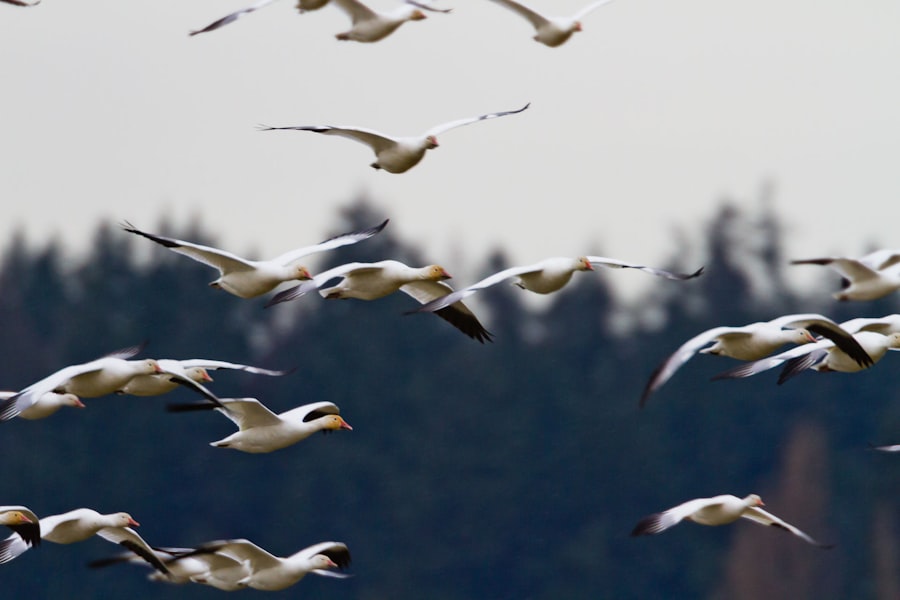
There are various repellents that can be used to keep geese away. Natural repellents such as vinegar or garlic can be sprayed on grass or other areas where geese tend to gather. The strong smell of these substances can deter geese from staying in the area.
Commercial repellents like Migrate Goose Repellent can also be effective in deterring geese. These repellents contain ingredients that are unpleasant to geese, such as grape extract or methyl anthranilate. They can be sprayed on grass, vegetation, or other surfaces to create a deterrent effect.
Modifying the environment to discourage geese
Modifying the environment can help to discourage geese from invading an area. One important step is to remove food sources that attract geese. This includes cleaning up spilled birdseed, securing garbage cans, and removing any other sources of food that may be accessible to geese.
Eliminating standing water is also important in deterring geese. Geese are attracted to areas with water sources, so removing or draining any stagnant water can make an area less appealing to them. This includes emptying birdbaths, fixing leaky faucets, and ensuring that drainage systems are functioning properly.
Keeping grass trimmed short can also help to discourage geese. Geese prefer areas with tall grass where they can hide and feed, so regularly mowing the lawn can make an area less attractive to them.
Educating people on how to avoid attracting geese
Educating people on how to avoid attracting geese is an important step in preventing geese problems. Properly disposing of food waste is crucial, as leaving food out can attract geese and encourage them to stay in an area. It is important to secure garbage cans and compost bins to prevent geese from accessing them.
Feeding geese should be discouraged, as it can lead to an overpopulation of geese in an area. Feeding geese can also make them more dependent on humans for food and less likely to migrate.
Keeping pets on leashes can also help to prevent geese problems. Geese are highly territorial and may become aggressive towards pets that approach their nesting areas. Keeping pets on leashes can help to avoid conflicts between geese and pets.
Seeking professional help to manage geese
If all else fails, it may be necessary to seek professional help to manage geese problems. Hiring a wildlife control company that specializes in goose management can provide effective solutions for deterring geese and preventing further issues. These professionals have the knowledge and experience to implement strategies that are safe and humane.
Consulting with a landscaping professional can also be beneficial in managing geese problems. They can assess the area and provide recommendations for modifying the landscape or implementing physical barriers that are effective in deterring geese.
Conclusion and summary of effective strategies for keeping geese away
In conclusion, understanding geese behavior is crucial in effectively keeping them away from residential areas, parks, and other public spaces. Geese can cause damage to property, create health risks, and contribute to noise pollution. By implementing natural methods such as planting certain types of vegetation, using decoys, and creating natural barriers with water features, it is possible to deter geese from invading an area.
Installing physical barriers such as fences, netting, spikes, or wires can also be effective in keeping geese away. Using sound and light to scare geese, as well as applying repellents, can further enhance the deterrent effect. Modifying the environment by removing food sources, eliminating standing water, and keeping grass trimmed short can help to discourage geese from staying in an area.
Educating people on how to avoid attracting geese and seeking professional help when needed are also important strategies in managing geese problems. By implementing these strategies and encouraging others to do the same, it is possible to prevent geese problems and create a more pleasant living environment for both humans and geese.
If you’re looking for effective ways to keep geese away, you might find this article on Poultry Wizard quite helpful. They provide valuable insights and tips on dealing with geese and other poultry-related issues. Check out their website at https://poultrywizard.com for more information. Additionally, if you’re interested in creating a chicken coop that doubles as a country diner, they have a fascinating article on that topic as well: https://poultrywizard.com/keeping-chickens/the-chicken-coop-country-diner/. And if you’re into keeping quails, they also have an article on what vegetables quails eat: https://poultrywizard.com/keeping-quail/what-vegetables-do-quails-eat/. Happy reading and good luck with your geese!
Meet Walter, the feathered-friend fanatic of Florida! Nestled in the sunshine state, Walter struts through life with his feathered companions, clucking his way to happiness. With a coop that’s fancier than a five-star hotel, he’s the Don Juan of the chicken world. When he’s not teaching his hens to do the cha-cha, you’ll find him in a heated debate with his prized rooster, Sir Clucks-a-Lot. Walter’s poultry passion is no yolk; he’s the sunny-side-up guy you never knew you needed in your flock of friends!

